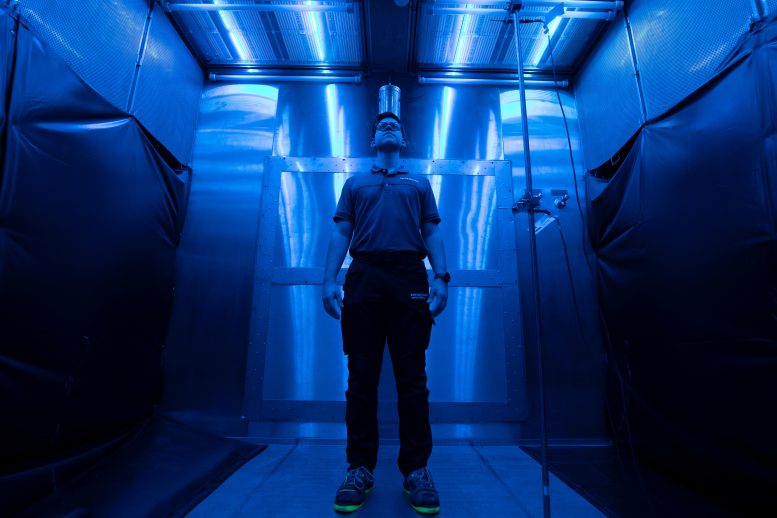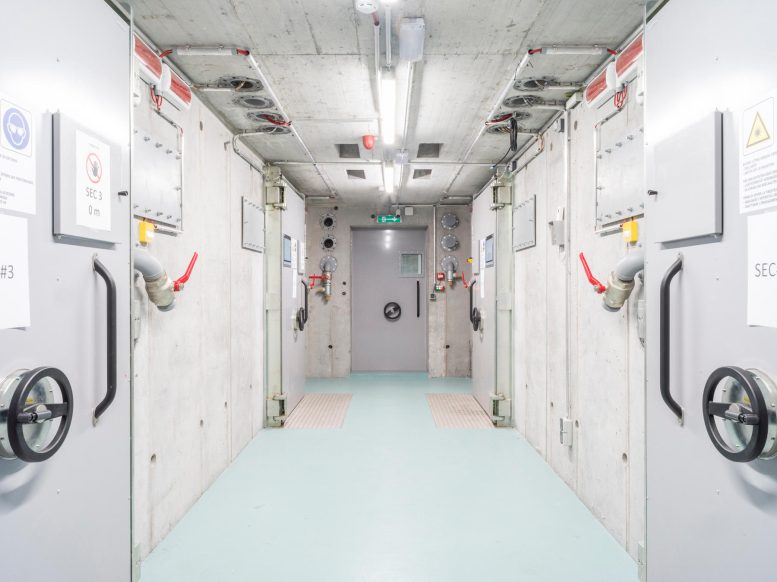New Research Reveals That Humans Are Much More Sensitive to Temperatures Than Previously Thought
A new study on human temperature perception demonstrated a consistent sensitivity to temperature differences among participants. This research, integral to the Grounded Cognition theory, has important implications for energy-efficient building climate control and is part of broader research efforts at terraXcube, which supports various scientific fields.
Research conducted in Eurac Research’s terraXcube, an extreme environment simulator, indicates that the human sensitivity to temperature variations is less than one degree Celsius.
The recent experiment was conducted by Laura Battistel and involved four climate chambers with temperature control set between 23 and 25 degrees Celsius. The study included twenty-six participants, comprising an equal number of 13 men and 13 women. These volunteers were tasked with comparing pairs of chambers by moving between them and then determining which chamber felt warmer and which felt colder.
Each person made 120 comparisons between pairs of rooms, resulting in a total of 3120 comparisons. Analysis of the data revealed an average threshold for perception of temperature differences of 0.92 degrees Celsius. Moreover, all the participants showed very similar temperature sensitivity. “This indicates that this may be an inherent characteristic of our species,” Battistel says. “We are all endowed with a pronounced sensitivity to environmental temperature, although we are not aware of it.”

Andrea Eccher, terraXcube technician, in one of the climatic chambers in which the experiments on human perception take place. Credit: Eurac Research/Andrea De Giovanni
The idea of studying human sensory capabilities using the terraXcube was the brainchild of Massimiliano Zampini, a full professor at CIMeC, University of Trento. The goal of this research is to find out what we can perceive about the environment around us.
Only in this way, can we deepen our knowledge of how the environment influences the way we think and act. In this sense, the study fits into the line of research on “Grounded Cognition,” the scientific theory according to which the cognition we have of our surroundings is inseparably linked to our sensory perception of the world itself. In other words, according to this theory, when we reflect, try to recall a lived experience or approach our surroundings, our senses are activated and they influence our thinking.
Implications for Building Climate Control
The results of the study have potential implications for the heating, ventilation and air conditioning sector in buildings. “From the perspective of energy sustainability, being able to determine a temperature range in which the individual maintains their state of comfort while reducing the building’s energy load would benefit us and the planet,” explains Riccardo Parin, supervisor of Battistel’s work.

The corridor connecting the four climate chambers of the Small Cube, one of the three environmental simulation areas that the terraXcube is divided into. Credit: Schirra/Giraldi
“In our study, however, we do not focus on participants’ thermal comfort. In fact, we are currently more interested in finding out how our perception changes at temperatures higher or lower than those generally considered comfortable. And this is what we will be investigating in future experiments”, Parin concludes.
“Our infrastructure is made available for research in a wide variety of fields. From clothing to emergency medicine in the mountains, from the automotive industry to climate change,” says Christian Steurer, director of terraXcube. “The idea of conducting research on the human psyche inside our climate chambers intrigued me right from the start. Now the project is starting to bear fruit. I am looking forward to the next developments.”
Reference: “An investigation on humans’ sensitivity to environmental temperature” by Laura Battistel, Andrea Vilardi, Massimiliano Zampini and Riccardo Parin, 4 December 2023, Scientific Reports.
DOI: 10.1038/s41598-023-47880-5

A new study on human temperature perception demonstrated a consistent sensitivity to temperature differences among participants. This research, integral to the Grounded Cognition theory, has important implications for energy-efficient building climate control and is part of broader research efforts at terraXcube, which supports various scientific fields.
Research conducted in Eurac Research’s terraXcube, an extreme environment simulator, indicates that the human sensitivity to temperature variations is less than one degree Celsius.
The recent experiment was conducted by Laura Battistel and involved four climate chambers with temperature control set between 23 and 25 degrees Celsius. The study included twenty-six participants, comprising an equal number of 13 men and 13 women. These volunteers were tasked with comparing pairs of chambers by moving between them and then determining which chamber felt warmer and which felt colder.
Each person made 120 comparisons between pairs of rooms, resulting in a total of 3120 comparisons. Analysis of the data revealed an average threshold for perception of temperature differences of 0.92 degrees Celsius. Moreover, all the participants showed very similar temperature sensitivity. “This indicates that this may be an inherent characteristic of our species,” Battistel says. “We are all endowed with a pronounced sensitivity to environmental temperature, although we are not aware of it.”

Andrea Eccher, terraXcube technician, in one of the climatic chambers in which the experiments on human perception take place. Credit: Eurac Research/Andrea De Giovanni
The idea of studying human sensory capabilities using the terraXcube was the brainchild of Massimiliano Zampini, a full professor at CIMeC, University of Trento. The goal of this research is to find out what we can perceive about the environment around us.
Only in this way, can we deepen our knowledge of how the environment influences the way we think and act. In this sense, the study fits into the line of research on “Grounded Cognition,” the scientific theory according to which the cognition we have of our surroundings is inseparably linked to our sensory perception of the world itself. In other words, according to this theory, when we reflect, try to recall a lived experience or approach our surroundings, our senses are activated and they influence our thinking.
Implications for Building Climate Control
The results of the study have potential implications for the heating, ventilation and air conditioning sector in buildings. “From the perspective of energy sustainability, being able to determine a temperature range in which the individual maintains their state of comfort while reducing the building’s energy load would benefit us and the planet,” explains Riccardo Parin, supervisor of Battistel’s work.

The corridor connecting the four climate chambers of the Small Cube, one of the three environmental simulation areas that the terraXcube is divided into. Credit: Schirra/Giraldi
“In our study, however, we do not focus on participants’ thermal comfort. In fact, we are currently more interested in finding out how our perception changes at temperatures higher or lower than those generally considered comfortable. And this is what we will be investigating in future experiments”, Parin concludes.
“Our infrastructure is made available for research in a wide variety of fields. From clothing to emergency medicine in the mountains, from the automotive industry to climate change,” says Christian Steurer, director of terraXcube. “The idea of conducting research on the human psyche inside our climate chambers intrigued me right from the start. Now the project is starting to bear fruit. I am looking forward to the next developments.”
Reference: “An investigation on humans’ sensitivity to environmental temperature” by Laura Battistel, Andrea Vilardi, Massimiliano Zampini and Riccardo Parin, 4 December 2023, Scientific Reports.
DOI: 10.1038/s41598-023-47880-5
